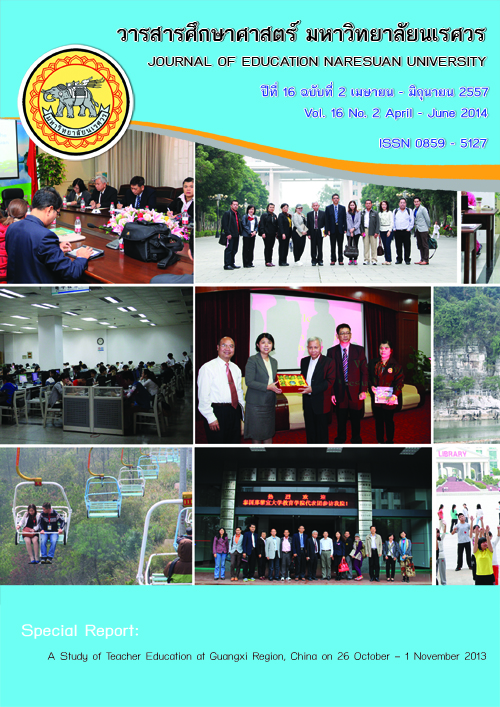รูปแบบการบริหารศูนย์การเรียนรู้สำหรับเด็กไร้สัญชาติในเขตชายแดนไทย-พม่า
Main Article Content
Abstract
บทคัดย่อ
การวิจัยในครั้งนี้มีวัตถุประสงค์หลักเพื่อพัฒนารูปแบบการบริหารศูนย์การเรียนรู้สำหรับเด็กไร้สัญชาติในเขตชายแดนไทย-พม่า มีขั้นตอนการดำเนินงาน 3 ขั้นตอน คือ 1) ศึกษาสภาพและความต้องการ การบริหารศูนย์การเรียนรู้สำหรับเด็กไร้สัญชาติในเขตชายแดนไทย-พม่า จำนวน 278 คน จำแนกเป็นผู้บริหาร 25 คน และครู 253 คน ถามผู้บริหาร และครูในศูนย์การเรียน และเก็บรวบรวมข้อมูลโดยใช้แบบสอบถามที่มีลักษณะตามมาตราประมาณค่า 5 ระดับ วิเคราะห์ข้อมูลโดยการหาค่าเฉลี่ย ค่าเบี่ยงเบนมาตรฐาน และการวิเคราะห์เนื้อหา 2) สร้างรูปแบบการบริหารศูนย์การเรียนรู้สำหรับเด็กไร้สัญชาติในเขตชายแดนไทย-พม่า โดยใช้การสนทนากลุ่ม มีผู้ทรงคุณวุฒิและผู้เกี่ยวข้อง จำนวน 25 คน พิจารณาร่างรูปแบบการบริหารศูนย์การเรียนรู้ในเขตชายแดนไทย-พม่า 3) ประเมินความเป็นไปได้ของรูปแบบการบริหารศูนย์การเรียนรู้สำหรับเด็กไร้สัญชาติในเขตชายแดน ไทย-พม่า จำนวน 30 คน โดยจัดสัมมนาผู้เชี่ยวชาญ จากกลุ่มนักวิชาการ ผู้ให้นโยบาย ผู้บริหาร องค์กรภาคเอกชน และครูในศูนย์การเรียนรู้ ผลการวิจัยปรากฏดังนี้
1. ผลการศึกษาสภาพและความต้องการ การบริหารศูนย์การเรียนรู้สำหรับเด็กไร้สัญชาติในเขตชายแดนไทย-พม่า ในการบริหารงาน 4 ด้านและโดยภาพรวม พบว่า สภาพการบริหารศูนย์การเรียนรู้สำหรับเด็กไร้สัญชาติในเขตชายแดนไทย-พม่า อยู่ในระดับปานกลาง ส่วนความต้องการบริหารศูนย์การเรียนรู้สำหรับเด็กไร้สัญชาติในเขตชายแดนไทย-พม่า โดยภาพรวมอยู่ในระดับมาก แต่การบริหารงานบุคคลอยู่ในระดับมากที่สุด
ผลการศึกษาสภาพและความต้องการเกี่ยวกับรูปแบบความร่วมมือในการบริหารศูนย์การเรียนรู้สำหรับเด็กไร้สัญชาติในเขตชายแดนไทย- พม่า ระหว่างภาครัฐกับภาคเอกชนประกอบด้วย 7 รูปแบบ พบว่าสภาพปัจจุบันความร่วมมือในการบริหารศูนย์การเรียนรู้สำหรับเด็กไร้สัญชาติในเขตชายแดนไทย-พม่า เรียงลำดับความถี่จากมากไปหาน้อย ได้แก่ 1) แบบอิสระ 2) แบบลูกผสม 3) แบบผู้จัดการ 4) แบบบริการ ส่วนความต้องการเกี่ยวกับรูปแบบความร่วมมือในการบริหารศูนย์การเรียนรู้สำหรับเด็กไร้สัญชาติในเขตชายแดนไทย - พม่า มี 2 รูปแบบ เรียงลำดับความถี่จากมากไปหาน้อย ได้แก่ 1) แบบลูกผสม 2) แบบอิสระ
2. ผลการสร้างรูปแบบการบริหารศูนย์การเรียนรู้สำหรับเด็กไร้สัญชาติในเขตชายแดนไทย-พม่า พบว่าองค์ประกอบ 4 องค์ประกอบ คือ 1) ด้านการบริหารงานวิชาการ 2) ด้านการบริหารงานงบประมาณ 3) ด้านการบริหารงานบุคคล 4) ด้านการบริหารงานทั่วไป และผลการตรวจสอบคุณภาพรูปแบบการบริหารศูนย์การเรียนรู้สำหรับเด็กไร้สัญชาติในเขตชายแดนไทย-พม่าพบว่า มีความเหมาะสมอยู่ในระดับมาก
ผลการสร้างรูปแบบความร่วมมือในการบริหารศูนย์การเรียนรู้สำหรับเด็กไร้สัญชาติในเขตชายแดนไทย- พม่า ระหว่างภาครัฐกับภาคเอกชน พบว่า รูปแบบลูกผสม มีความเหมาะสมอยู่ในลำดับที่ 1
3. ผลการประเมินความเป็นไปได้ของรูปแบบการบริหารศูนย์การเรียนรู้สำหรับเด็กไร้สัญชาติในเขตชายแดนไทย-พม่า รูปแบบลูกผสม พบว่าผู้ทรงคุณวุฒิ ผู้บริหารศูนย์ฯ ผู้นำองค์กรภาครัฐ-ภาคเอกชน และครูมีความเห็นว่าโดยภาพรวมมีความเป็นไปได้ในการนำรูปแบบลูกผสมนี้ไปใช้อยู่ในระดับมาก โดยองค์ประกอบการผสมผสานการบริหารในแต่ละด้าน แตกต่างกัน
คำสำคัญ: บริหารศูนย์การเรียนรู้/ เด็กไร้สัญชาติ/ ชายแดนไทย-พม่า
Abstract
The purpose of this study was to develop the appropriate administrative model of the Learning Center for stateless children in Thai – Myanmar border areas. The research was based on three steps. The first step involved the study of present conditions of and needs for the administration of learning centers for stateless children in Thai – Myanmar border areas through opinion surveying of 25 administrators and 253 teachers. The data analysis used Means and Standard Deviation. The second step was the formulation of the model for the administration of the learning centers, using the results of the first step for drafting then evaluating its appropriateness by a focus group discussion stakeholder of 25 experts. The third step was the evaluation of applicability of the model by a connoisseur of 30 experts
The research results of this study were as follows:
1. According to the four administrative operations of (1) Academic administration, (2) Budget administration, (3) Human Resource administration, and (4) General administration, the overall study results had the moderate level, the overall administrative demand for the Learning Center for Thai – Myanmar Border Stateless Children had the high level, but the human resource administration had the highest level.
The study results of situation and demand for the Learning Center for Thai – Myanmar Border Stateless Children related to the administrative co-operation between public and private sectors consisted to seven arrangements of (1) Service Type, (2) Manager Type, (3) Contract Type, (4) Independent Type, (5) Construction-Operation-Transfer Type, (6) Joint-venture Type and (7) Hybrid Type. It was found that the outcomes, categorized from high to low frequency, of the current administrative co-operation in the Learning Center for Thai – Myanmar Border Stateless Children were (1) Independent Type, (2) Mixed-method Type, (3) Manager Type and (4) Service Type, respectively. On the other hand, the demand of administrative co-operation in the Learning Center for Thai – Myanmar Border Stateless Children had two types, categorized from high to low frequency, of (1) Hybrid Type and (2) Independent Type.
2. The formulation model of the Learning Center for Thai – Myanmar Border Stateless Children composed of four elements of (1) Academic administration, (2) Budget administration, (3) Human Resource administration, and (4) General administration. The quality assurance result of this model had the appropriate high level.
The formulation model for co-operation between public and private sectors in the Learning Center for Thai – Myanmar Border Stateless Children was consisted of (1) Service Type, (2) Manager Type, (3) Contract Type, (4) Independent Type, (5) Construction-Operation-Transfer Type, (6) Joint-venture Type and (7) Hybrid Type. The result of the quality assurance for appropriateness of administrative co-operation model per expertise’s opinions was that the Hybrid one was the most suitable in the first rank.
3. The assessment result of possible administrative style model for the Learning Center for Thai – Myanmar Border Stateless Children with Hybrid Arrangement was that the experts, the administrative members of the Learning Center for Thai – Myanmar Border Stateless Children, Non-Governmental Organizations (NGOs) and teachers were strong agreed to use the Hybrid Arrangement.
Key words: Learning Center management/ Stateless Children/ Thailand-Myanmar BorderArticle Details
The owner of the article does not copy or violate any of its copyright. If any copyright infringement occurs or prosecution, in any case, the Editorial Board is not involved in all the rights to the owner of the article to be performed.


